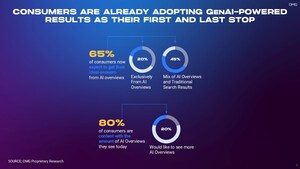
Pfizer and AstraZeneca Take Top Slots on First Digital IQ Index for Pharma Brands
New L2 Study Provides Actionable Metric for Optimizing Digital ROI
Lifestyle Soars, Cardiology Surprises, Asthma & Allergy Sinks
Social Media Remains the Third Rail
NEW YORK, May 5 /PRNewswire-FirstCall/ -- Pfizer's Viagra and AstraZeneca's Nexium took the top-two slots on the new L2 Digital IQ Index for pharmaceutical brands, a first-of-its kind measurement of the digital competence of 51 pharma brands across eight therapeutic categories, designed to provide an actionable metric to optimize pharmaceutical digital ROI.
The ranking, created by think tank L2 in partnership with leading media agency PHD Network, evaluated pharmaceutical brands' digital presence across four criteria: Platform (40 percent, including site effectiveness and brand translation); Off-Platform Messaging (25 percent, covering digital marketing efforts such as online and mobile advertising); Search Engine Optimization (20 percent, based on visibility on top search engines); and Social Media (15 percent, defined by presence on popular 2.0 platforms). Each brand was scored against more than one hundred qualitative and quantitative data points, and assigned a Digital IQ ranking of Genius, Gifted, Average, Challenged or Feeble.
A Digital Powerhouse Emerges
While the third spot on the Index was also claimed by a Pfizer brand, Chantix, AstraZeneca emerged as the industry's digital powerhouse. With three brands in the top ten – Nexium, Crestor, and Symbicort and four in the top twenty, AstraZeneca had the best showing of any company on the Index.
| The list of brands scoring in the Digital IQ Index top ten: |
|
| 1. Viagra (Pfizer) |
|
| 2. Nexium (AstraZeneca) |
|
| 3. Chantix (Pfizer) |
|
| 4. Ortho Tri-Cyclen Lo (Ortho-McNeil Janssen) |
|
| 5. Crestor (AstraZeneca) |
|
| 6. Tie between Gardasil (Merck) and Yaz (Bayer) |
|
| 8. Tie between Symbicort (AstraZeneca) and NuvaRing (Merck) |
|
| 10. Lunesta (Sepracor) |
|
"Our analysis shows that, despite the challenges inherent in an ambiguous regulatory environment, some brands are innovating online and building a foundation for digital growth once a clearer path is illuminated," says L2 founder and NYU marketing professor Scott Galloway. "However," Galloway continues, "the industry as a whole disappoints as most brands offer obsolete technology, anemic content and scant social media programs."
Social Media Remains the Third Rail
Indeed, as the Index reveals, the lack of a defined regulatory policy has paralyzed social media efforts. While 80 percent of pharmaceutical companies maintain a presence on YouTube, Facebook or Twitter, only 19 percent of brands participate on social media platforms.
Summing up the challenge in terms of the pharmaceutical industry's current capacity to effectively engage with the 109 million consumers who go online each year to seek healthcare information, PHD Network CEO Scott Hagedorn says, "Right now, there are millions of unregulated conversations taking place online regarding prescription drugs, from which the voice of pharmaceutical companies is mostly absent."
Other key Index findings include:
- Lifestyle drugs, which most closely resemble consumer package goods in how they are marketed, consistently scored high in the survey.
- Cardiology, the largest category in the study (as defined by the number of brands included), had a surprisingly high number of brands in the Feeble ranking – more than any other disease state.
- Brands in the Asthma & Allergy category demonstrated the lowest average IQ of the eight disease states. With the exception of AstraZeneca's highly rated Symbicort, sites in the category suffer from poor traffic, weak content, and do little to build community or prompt patient action.
- Paid search has rebounded since the FDA's search letters in April 2009 and 70% of pharma brands purchase keywords. Search engine visibility still lags third party health portals.
- Brands marketing to disease states with a younger age of onset demonstrate higher Digital IQ than brands marketing to older patients, despite growth in Internet and social media use among middle-aged and senior demographics.
- There is an average IQ dispersion of 40 points across brands within the same parent company, suggesting digital innovation within the industry is siloed at the brand level.
Describing the Index's potential value to pharmaceutical marketers, Scott Galloway says, "Digital aptitude will be a defining competence that separates winners from losers. Our ranking aims to provide an actionable metric that pharma companies can use to determine where they will garner greatest return on incremental investment in digital."
Complete survey results can be found at: http://l2thinktank.com/digitaliq/pharma.
About L2
L2 is a think tank for prestige brands focused on marketing innovation. Founded by NYU Stern professor of marketing Scott Galloway, L2 helps brands navigate the digital marketing landscape through events, research and advisory services. The L2 Digital IQ Index is the largest and most robust study of its kind. Rankings are published annually across industries including Pharmaceutical, Luxury, Auto, Specialty Retail and Travel.
About PHD Network
Founded in London in 1990 as the first strategic media agency, PHD (www.phdnetwork.com) is a proven innovator in communications design and execution with 2,000 employees in over 60 countries.
The PHD Network is part of the Omnicom Media Group (www.omnicommediagroup.com), a division of Omnicom Group Inc. (NYSE: OMC) (www.omnicomgroup.com). Omnicom is a leading global marketing and corporate communications company. Omnicom's branded networks and numerous specialty firms provide advertising, media, direct and promotional marketing, public relations and other specialty communications services to over 5,000 clients in more than 100 countries
SOURCE Omnicom Media Group







Share this article